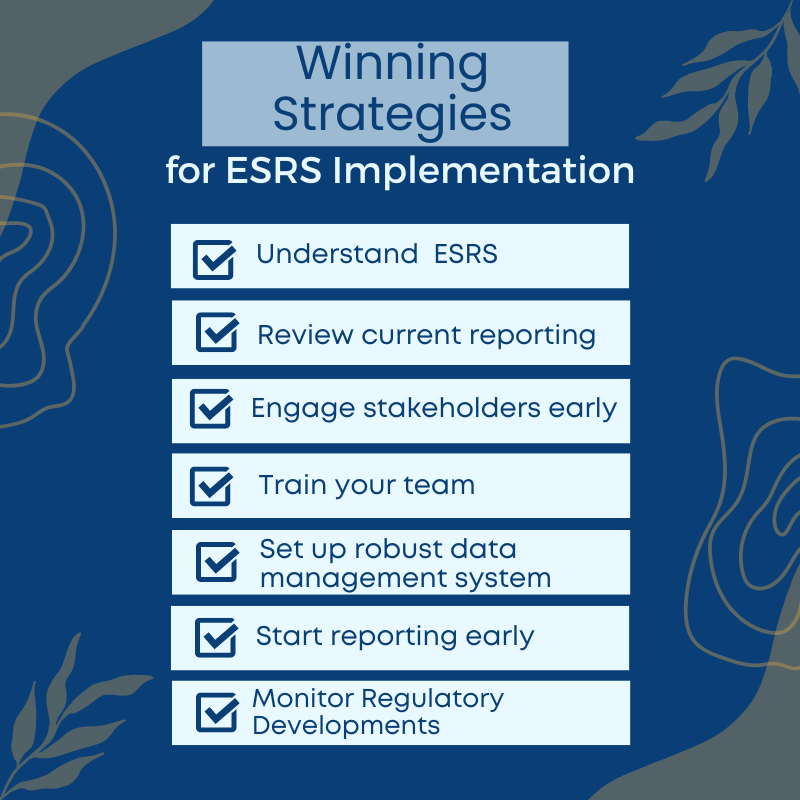Bolstering Relations Through Transparent Sustainability Reporting
In the evolving landscape of corporate responsibility and sustainability, trust and engagement are paramount. Stakeholders, including users of sustainability information, investors, and creditors, are increasingly interested in the environmental, social, and governance (ESG) performance of companies. To meet this need, the European Sustainability Reporting Standards (ESRS) have been introduced, and they promise to elevate stakeholder trust and engagement significantly.

European Sustainability Reporting Standards: An Overview
Understanding the ESRS, developed by the European Financial Reporting Advisory Group (EFRAG), is key. It is a set of standards embodying the Corporate Sustainability Reporting Directive (CSRD), shifting sustainability reporting from a peripheral to a central element of corporate reporting. The ESRS is a significant development, providing a comprehensive framework for Environmental, Social, and Governance (ESG) performance reporting. It standardizes reporting across EU member states, enhancing consistency and comparability.
ESRS aligns with global frameworks like the Global Reporting Initiative (GRI) and the Sustainability Accounting Standards Board (SASB). It accommodates regional regulations and societal expectations, supporting the EU’s ambition to become the world’s first climate-neutral continent by 2050 under the European Green Deal.
Adopting ESRS offers companies a unified approach to sustainability reporting, covering topics like climate change, biodiversity, human rights, and anti-corruption measures. It fosters transparency and accountability, requiring disclosure of both positive and negative impacts. A rigorous double materiality assessment process identifies the most relevant ESG factors for reporting.
The first set of 12 ESRS standards was published in November 2022, outlining various disclosure requirements. Compliance with these standards fulfills the CSRD’s objectives. The European Commission anticipates adopting these standards by 30 June 2023, and future developments will create standards for SMEs, sector-specific standards, and those for non-European companies.
Curious about the impact opportunities and challenges the ESRS present to your business? Check out our blog “ESRS: An Opportunity or a Challenge for Companies Operating in the EU?“
The Imperative of Stakeholder Trust and Engagement
If you prefer visual content over reading the blog, watch this summary video:
In the era of corporate transparency, trust and engagement of stakeholders, including investors, creditors, and users of sustainability information, are key to a company’s growth. Transparent sustainability reporting fosters this trust and enhances engagement, driving success.
Stakeholders, potentially influenced or affected by a company’s actions, can be divided into two groups: affected stakeholders, directly impacted by the company’s operations, and users of sustainability statements who rely on this information for decision-making. Other stakeholders include employees, suppliers, customers, communities, and authorities with an interest in the company’s sustainability outcomes.
Compliance with the CSRD and ESRS necessitates recognizing stakeholder engagement’s vital role in the double materiality assessment process and sustainability reporting. Involving internal (employees) and external (communities, trade unions) stakeholders can provide invaluable insights, highlighting crucial issues.
Stakeholder engagement enables companies to identify material topics that impact their business and society at large. This inclusive approach addresses the concerns of those affected by the company’s operations and fosters trust and empowerment, driving growth.
Companies can utilize stakeholder expertise to enhance decision-making, identify areas of improvement, and align their sustainability efforts with community needs and values. By involving stakeholders in the sustainability reporting process, companies demonstrate transparency and foster collaboration, leading to sustainable outcomes.
In conclusion, effective stakeholder engagement is vital for CSRD and ESRS compliance. Involving stakeholders from different spheres helps companies gain insights, address issues, and foster meaningful relationships. Embracing this as part of the sustainability reporting process contributes to long-term success and societal impact.
The ESRS Impact: A Catalyst for Stakeholder Trust
ESRS propels corporate transparency to new heights. With its stringent guidelines for sustainability reporting, it necessitates corporations to provide clear, comprehensive, and accurate accounts of their sustainability initiatives. This transparency in sustainability reporting engenders stakeholder trust.
By adhering to ESRS, corporations provide an in-depth view of their operations, including their environmental footprint, social impacts, and governance structures. This level of transparency allays stakeholders’ concerns about hidden operational risks related to ESG factors. Moreover, by portraying an accurate picture of their sustainability endeavors, corporations showcase their commitment to ethical practices and social responsibility, which further boosts stakeholder trust.
The ESRS Effect: A Driver for Stakeholder Engagement
ESRS goes beyond establishing trust and takes a critical role in stimulating stakeholder engagement. The standards provide a structured framework that fosters consistency and comparability in sustainability reports, enabling stakeholders to easily understand and compare corporations’ sustainability efforts. This consistency plays a crucial role in facilitating stakeholders’ decision-making processes.
Meaningful engagement relies on informed decisions. When stakeholders, such as investors, creditors, researchers, policy-makers, and consumers, have access to detailed and reliable sustainability information, they can align their actions, investments, and choices with their values, risk appetite, and objectives. The ESRS empowers these stakeholders by providing comprehensive and standardized sustainability reports that enable them to make informed choices and derive valuable insights.
Moreover, the ESRS actively encourages corporations to engage in a dialogue with their stakeholders about their sustainability efforts. By focusing on sustainability matters that are most relevant to stakeholders, companies can foster a stronger connection and trust. Through proactive communication of their sustainability strategies, challenges, and achievements, corporations can encourage active participation from stakeholders and create an environment where their voices are heard and valued.
In the context of CSRD/ESRS, stakeholders play a vital role as affected individuals or groups, and as users of sustainability statements. They contribute to the company’s due diligence process, providing valuable insights and reliable data to understand the material impacts, both positive or negative, actual or potential. Effective stakeholder engagement is a key component of this process, ensuring that companies collect accurate and comprehensive information that reflects the concerns and expectations of those directly affected by their operations.
By embracing active and effective stakeholder engagement, companies can enhance the quality and relevance of their sustainability statements, strengthen trust among stakeholders, and drive positive change in line with the objectives of the CSRD/ESRS.
Conclusion: ESRS – A Pathway to Trust and Engagement
In conclusion, ESRS holds immense potential to bolster stakeholder trust and engagement. Through transparent sustainability reporting, it enhances corporate credibility and promotes informed decision-making, stimulating trust and meaningful engagement. By complying with ESRS, corporations can not only meet their reporting obligations but also foster stronger relations with their stakeholders, contributing to their long-term success.
The advent of ESRS is a testament to the rising importance of sustainability in the corporate world. It signifies a shift towards a more transparent, accountable, and sustainable future, where stakeholder trust and engagement take center stage. As we move forward, the role of ESRS in shaping corporate-stakeholder relations will undoubtedly continue to evolve, offering a new horizon for corporate sustainability.
For further information on stakeholder engagement within the double materiality assessment process, refer to ESRS 1: General requirements. This standard provides detailed guidelines on how companies can effectively incorporate stakeholder engagement into their sustainability reporting practices.
Additionally, our General Standards Course offers comprehensive insights into this topic, featuring illustrative examples that highlight how stakeholder engagement enables companies to report on their sustainability performance more effectively. Enroll in our courses to deepen your understanding and gain practical knowledge on the importance of stakeholder engagement in sustainability reporting.


